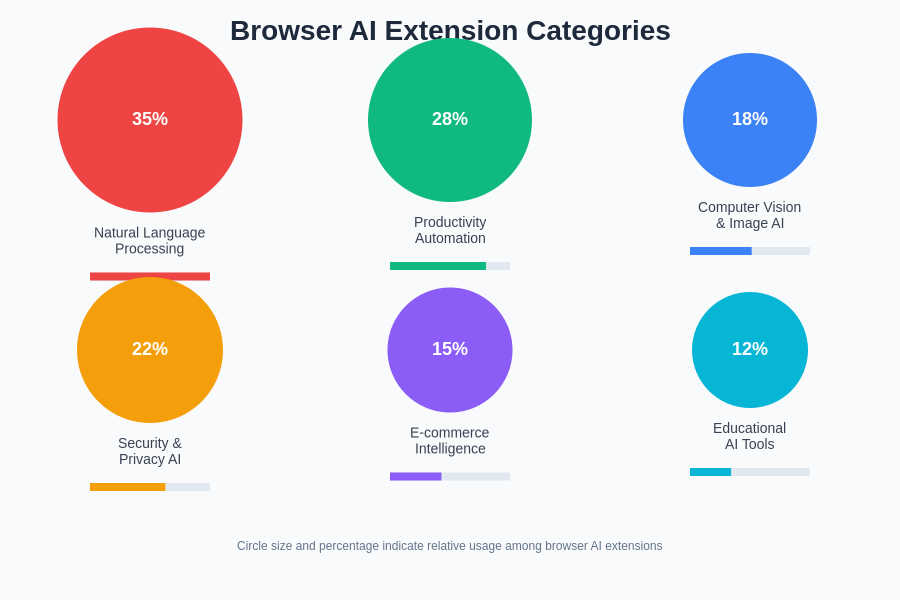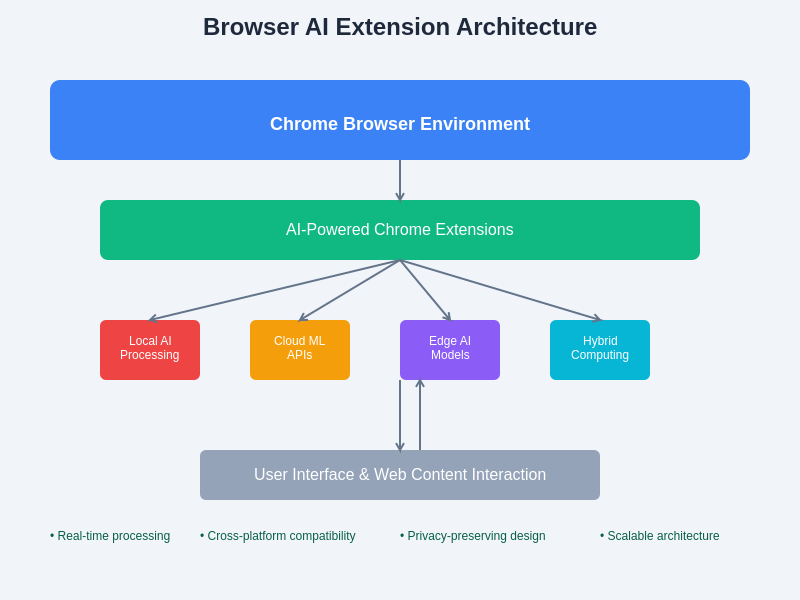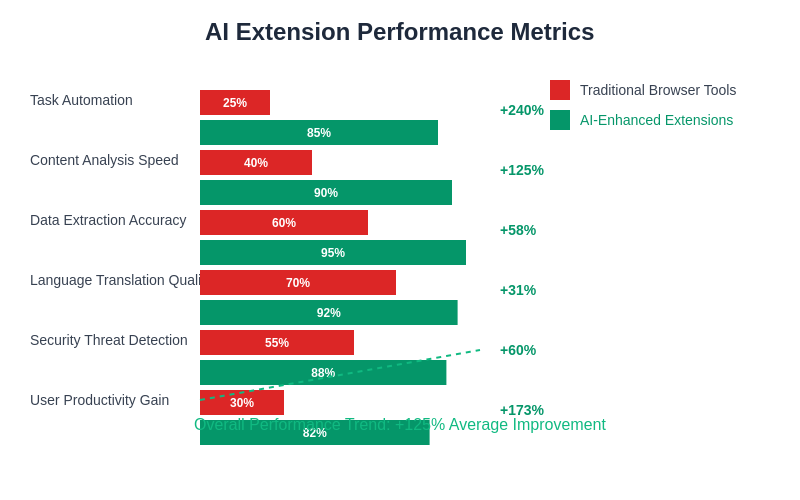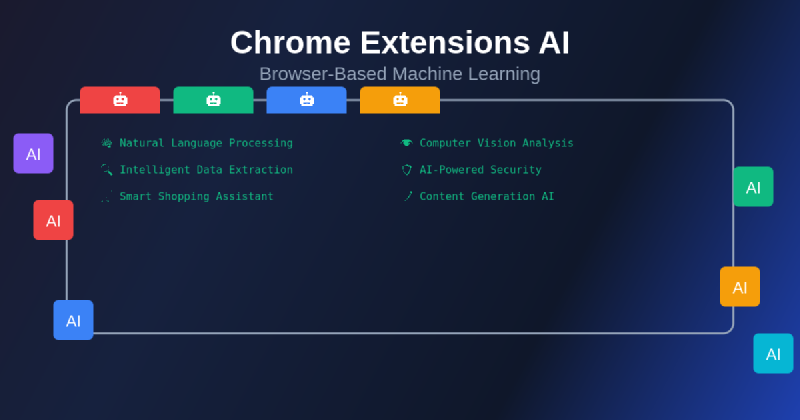The modern web browser has evolved far beyond its original purpose as a simple document viewer, transforming into a sophisticated platform capable of running complex applications and, increasingly, artificial intelligence systems. Chrome extensions powered by AI represent the cutting edge of this evolution, bringing machine learning capabilities directly into users’ daily browsing experiences and fundamentally changing how we interact with web content, manage information, and enhance our digital productivity.
Discover the latest AI trends and innovations that are shaping the future of browser-based artificial intelligence and transforming how we experience the web. The integration of AI into browser extensions represents a democratization of machine learning technology, making sophisticated AI capabilities accessible to millions of users without requiring technical expertise or specialized software installations.
The Browser AI Revolution
The emergence of AI-powered Chrome extensions marks a significant milestone in the accessibility and ubiquity of artificial intelligence technology. Unlike traditional AI applications that require complex installations or cloud-based subscriptions, browser extensions provide seamless integration of machine learning capabilities directly into the user’s existing web environment. This accessibility has democratized AI technology, enabling users to leverage sophisticated machine learning algorithms for tasks ranging from content analysis and language translation to automated data extraction and intelligent content generation.
The browser-based approach to AI deployment offers unique advantages including universal compatibility across different operating systems, automatic updates through the Chrome Web Store, and the ability to interact directly with web content in real-time. These extensions can analyze page content, extract meaningful information, process user inputs, and provide intelligent responses without requiring users to switch between applications or learn new interfaces.
Natural Language Processing Extensions
Natural language processing represents one of the most impactful categories of AI-powered Chrome extensions, offering users unprecedented capabilities for text analysis, language translation, and content comprehension. These extensions leverage advanced language models to provide real-time grammar checking, style suggestions, sentiment analysis, and automated summarization of web content. Users can highlight any text on a webpage and receive instant analysis, translation, or enhancement suggestions without leaving their current browsing context.
Advanced NLP extensions go beyond simple text processing to offer contextual understanding and intelligent content generation. These tools can analyze email threads and suggest appropriate responses, summarize lengthy articles into key points, detect and explain complex technical terminology, and even generate creative content based on user prompts. The integration of large language models into browser extensions has essentially placed a powerful writing and analysis assistant at users’ fingertips for any web-based activity.
Experience advanced AI capabilities with Claude for sophisticated reasoning and natural language processing that can be integrated into various browser-based workflows and applications. The synergy between powerful AI models and browser accessibility creates opportunities for enhanced productivity and more intelligent web interactions.
Computer Vision and Image Analysis
Computer vision capabilities in Chrome extensions have opened new possibilities for visual content analysis and image-based interactions. These extensions can analyze images on web pages to extract text through optical character recognition, identify objects and scenes, detect faces and expressions, and even generate descriptions for accessibility purposes. Users can right-click on any image to access AI-powered analysis tools that provide insights into visual content that might otherwise require specialized software or technical expertise.
Advanced computer vision extensions offer capabilities such as reverse image searching with AI-enhanced results, automatic image optimization for web performance, visual content moderation for safer browsing, and augmented reality features that overlay digital information onto real-world images. These tools have proven particularly valuable for e-commerce applications, educational content analysis, and accessibility enhancement for users with visual impairments.
Data Extraction and Web Scraping
AI-powered data extraction extensions have revolutionized how users collect and organize information from websites. These intelligent tools can automatically identify and extract structured data from web pages, recognize patterns in content layout, and convert unstructured information into organized formats such as spreadsheets or databases. Unlike traditional web scraping tools that require technical configuration, AI-driven extensions can understand content context and adapt to different website structures automatically.
The machine learning algorithms powering these extensions can identify relevant information based on user intent, filter out irrelevant content, and organize extracted data according to intelligent categorization schemes. Users can extract contact information from business directories, collect product details from e-commerce sites, gather research data from academic publications, and compile information from social media platforms with minimal manual intervention.
Productivity and Workflow Automation
The integration of AI into productivity-focused Chrome extensions has created powerful workflow automation capabilities that adapt to individual user patterns and preferences. These extensions can learn from user behavior to suggest optimal browsing paths, automatically organize bookmarks based on content analysis, predict which tabs users are likely to need next, and provide intelligent reminders based on browsing context and calendar integration.
Advanced productivity extensions utilize machine learning to understand user work patterns and provide proactive assistance. They can automatically generate meeting summaries from web-based conference calls, suggest relevant documents based on current browsing activity, optimize tab management to reduce memory usage, and provide intelligent notifications that respect user focus and attention patterns. The AI algorithms continuously learn from user interactions to provide increasingly personalized and effective assistance.

The diverse landscape of browser-based AI tools encompasses multiple specialized categories, each addressing specific user needs and use cases. From natural language processing and computer vision to productivity automation and security enhancement, these extensions demonstrate the versatility and broad applicability of artificial intelligence in browser environments.

The technical architecture underlying browser-based AI extensions demonstrates the sophisticated integration of local processing, cloud-based machine learning APIs, and edge computing capabilities. This hybrid approach ensures optimal performance while maintaining user privacy and providing seamless integration with existing web workflows.
Security and Privacy Enhancement
AI-powered security extensions provide sophisticated protection against evolving online threats through intelligent analysis of web content, user behavior patterns, and potential security risks. These extensions can detect phishing attempts by analyzing webpage structure and content similarity to known malicious sites, identify suspicious download links through machine learning classification, and provide real-time warnings about potentially dangerous web interactions.
Advanced security extensions utilize behavioral analysis to detect unusual browsing patterns that might indicate account compromise or malware infection. They can monitor for suspicious form submissions, detect unauthorized access attempts, and provide intelligent password management with AI-enhanced security recommendations. The machine learning algorithms powering these extensions continuously update their threat detection capabilities based on emerging security trends and attack patterns.
Enhance your research capabilities with Perplexity for comprehensive information gathering and analysis that complements browser-based AI tools for enhanced productivity and research efficiency. The combination of multiple AI systems creates a powerful ecosystem for intelligent web browsing and content analysis.
E-commerce and Shopping Intelligence
The application of AI to e-commerce browsing has created intelligent shopping assistants that enhance the online purchasing experience through automated price comparison, product analysis, and personalized recommendations. These extensions can analyze product pages to extract specifications, compare prices across multiple retailers, track price history and trends, and predict optimal purchase timing based on historical data patterns.
Machine learning algorithms power sophisticated product recommendation engines that understand user preferences, analyze product reviews to extract key insights, detect fake reviews and fraudulent listings, and provide personalized suggestions based on browsing history and purchase patterns. These tools have transformed online shopping from a manual research process into an intelligently assisted experience that saves time and improves purchase decisions.
Content Creation and Enhancement
AI-powered content creation extensions have democratized access to sophisticated writing and creative tools, enabling users to generate high-quality content directly within their browser environment. These extensions can assist with blog post creation, social media content generation, email composition, and creative writing projects by providing intelligent suggestions, style improvements, and content optimization recommendations.
Advanced content creation tools utilize natural language generation to produce original content based on user prompts, optimize existing content for search engine visibility, generate alternative phrasings and style variations, and provide intelligent editing suggestions that improve readability and engagement. The integration of these capabilities into browser extensions eliminates the need for separate content creation applications and enables seamless workflow integration.
Educational and Learning Support
Educational AI extensions have transformed web browsing into an enhanced learning experience by providing intelligent tutoring, concept explanation, and knowledge assessment capabilities. These tools can analyze educational content on web pages to generate study materials, create practice questions, explain complex concepts in simplified language, and provide personalized learning paths based on user comprehension patterns.
The machine learning algorithms powering educational extensions can adapt to individual learning styles, track progress across multiple subjects and websites, provide intelligent spaced repetition for knowledge retention, and connect related concepts across different sources to enhance understanding. These capabilities have made self-directed learning more effective and accessible to users of all educational backgrounds.
Real-time Translation and Communication
AI-powered translation extensions have eliminated language barriers in web browsing by providing instant, contextually accurate translation of web content, social media posts, and online communications. These tools go beyond simple word-for-word translation to understand cultural context, maintain conversational tone, and preserve meaning across different languages and communication styles.
Advanced translation extensions can handle specialized terminology, maintain formatting in translated content, provide pronunciation guides for spoken languages, and even facilitate real-time multilingual conversations through intelligent chat translation. The continuous learning capabilities of these systems improve translation accuracy over time and adapt to regional dialects and emerging language usage patterns.

Performance analysis of AI-powered Chrome extensions reveals significant improvements in user productivity, accuracy of automated tasks, and overall browsing experience quality. These metrics demonstrate the tangible benefits of integrating artificial intelligence into everyday web interactions and highlight the growing sophistication of browser-based AI tools.
Development Framework and APIs
The technical foundation supporting AI-powered Chrome extensions has evolved to include sophisticated frameworks and APIs that simplify the integration of machine learning capabilities into browser-based applications. Modern extension development platforms provide access to pre-trained AI models, cloud-based processing capabilities, and standardized interfaces for common AI tasks such as natural language processing, computer vision, and predictive analytics.
Developers can leverage these frameworks to create extensions that utilize state-of-the-art AI models without requiring extensive machine learning expertise or computational resources. The availability of browser-based AI APIs has accelerated the development of intelligent extensions and enabled more developers to create AI-powered tools that enhance user experiences across diverse use cases and applications.
Privacy and Ethical Considerations
The integration of AI into browser extensions raises important questions about data privacy, user consent, and ethical AI deployment that developers and users must carefully consider. Many AI-powered extensions require access to browsing data, personal information, and user interactions to function effectively, creating potential privacy risks that must be balanced against the benefits of enhanced functionality.
Responsible AI extension development involves implementing strong data protection measures, providing transparent information about data usage, obtaining explicit user consent for AI processing activities, and ensuring that AI algorithms operate fairly and without bias. Users must also be educated about the privacy implications of AI extensions and empowered to make informed decisions about which tools to install and how to configure privacy settings.
Future Evolution and Emerging Capabilities
The future of AI-powered Chrome extensions promises even more sophisticated capabilities as machine learning technology continues to advance and browser platforms evolve to support more complex AI integrations. Emerging trends include the development of multi-modal AI extensions that combine text, image, and audio processing capabilities, improved offline AI functionality that reduces dependence on cloud services, and more personalized AI assistants that learn from individual user patterns over extended periods.
The integration of advanced AI models with browser extension frameworks will likely enable capabilities such as predictive browsing that anticipates user needs, intelligent content curation that filters information based on personal relevance, and adaptive user interfaces that optimize themselves for individual usage patterns. These developments will further blur the distinction between traditional web browsing and AI-assisted digital experiences.
Technical Implementation and Performance
The technical architecture of AI-powered Chrome extensions involves careful optimization to balance functionality with performance constraints inherent in browser environments. Developers must consider factors such as memory usage, processing efficiency, network bandwidth requirements, and battery consumption while delivering sophisticated AI capabilities. Modern extensions utilize techniques such as model compression, edge computing, and intelligent caching to provide responsive AI functionality without degrading browser performance.
The implementation of AI in browser extensions often involves hybrid architectures that combine local processing for privacy-sensitive tasks with cloud-based computation for resource-intensive operations. This approach enables extensions to provide real-time AI responses while maintaining user privacy and managing computational resources efficiently. As browser capabilities continue to expand, we can expect to see more sophisticated AI implementations that take advantage of emerging web technologies and hardware acceleration.
Market Impact and Adoption Trends
The growing adoption of AI-powered Chrome extensions reflects broader trends toward AI integration in everyday digital tools and represents a significant market opportunity for developers and technology companies. User adoption patterns show strong preference for extensions that provide immediate, tangible benefits while maintaining ease of use and reliability. The success of AI extensions demonstrates user appetite for intelligent automation and assistance in web-based activities.
Market analysis reveals that the most successful AI extensions focus on solving specific, well-defined problems rather than attempting to provide general-purpose AI capabilities. Extensions that excel in areas such as writing assistance, productivity automation, or specialized content analysis tend to achieve higher user satisfaction and retention rates than those offering broad but shallow AI functionality.
The continued growth of the AI extension ecosystem has important implications for web development, digital marketing, and online user experience design. As AI capabilities become more commonplace in browser environments, users will increasingly expect intelligent assistance and automation in their web interactions, driving further innovation and development in this space.
Disclaimer
This article is for informational purposes only and does not constitute professional advice regarding the selection, implementation, or use of AI-powered browser extensions. The views expressed are based on current understanding of artificial intelligence technologies and their applications in browser environments. Readers should conduct their own research and consider their specific requirements, privacy preferences, and security needs when evaluating and installing AI extensions. The effectiveness and safety of AI-powered extensions may vary depending on specific use cases, individual usage patterns, and the evolving landscape of browser security and privacy standards.
